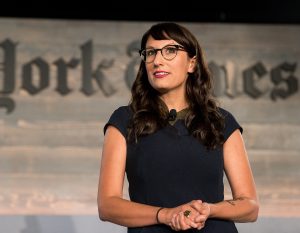As many as 69 women have accused Donald Trump of sexual misconduct, yet their stories have faded into the chasm of “another accuser” in the public mind, according to New York Times columnist Jessica Bennett.
In a 3,330-word essay for the paper, Bennett tells the stories of some of these women who have formed what they call the “Sisterhood of the Strange Sorority.”
Most of their stories have been made public before but the volume of the accusations is so great that American voters seem unable to comprehend them and thus have moved on.

Jessica Bennett
In a reader email introducing the story, she writes: “The words ‘another new accuser’ began to sound like background noise. The women’s names became numbers, and then the numbers started to get confusing. What exactly constituted ‘misconduct’? Did it count if he was merely ogling? How was the public supposed to understand which stories were corroborated by journalists, by lawyers or by nobody at all?
“With the exception of E. Jean Carroll, who won millions in court after Trump denied assaulting her, most of these women have faded from public view. The news cycle has moved on to more pressing realities — Trump’s other legal troubles; abortion; war — and they too have tried to move on with their lives.”
The main article tells stories like those of Natasha Stoynoff, who says Trump assaulted her in 2005 while she was on assignment from People magazine to write about his wedding anniversary. The alleged assault happened as a seven-months-pregnant Melania Trump was upstairs changing. “You know my one regret is that I didn’t deck him,” she says now.
She tells of Jill Harth, a makeup artist who sued Trump for sexual harassment and attempted rape.
Then there’s Karena Virginia, a yoga instructor who accused Trump of groping her at the U.S. Open in 1998.
And Alva Johnson, a former human resources executive and event planner who worked for Trump’s 2016 campaign and has accused him of kissing her on the job.
And Jessica Leeds, a retired stockbroker who accused Trump of molesting her on a plane in the late 1970s.
Trump, who famously bragged in the Access Hollywood tape that when you’re a male star you can grab women by the genitals without repercussion, has amassed a huge stack of accusations of doing just that and more.
Bennett writes: “Depending on how you count them, 19 or 26 or 67 women have accused Mr. Trump of sexual misconduct. Women who have said he ‘squeezed my butt,’ ‘eyed me like a piece of meat,’ ‘stuck his hand up my skirt,’ ‘thrust his genitals,’ ‘forced his tongue in my mouth,’ was ‘rummaging around my vagina,’ and so on.”
Even with the force of their numbers, these women still have trouble being heard and being believed.
As with E. Jean Carroll, whom a jury found credible, Trump has denied all accusation of his own alleged abuses. Bennett notes the former president has accused the women of being “political operatives,” plotting a “conspiracy against you, the American people,” looking for their “10 minutes of fame” and not being his “type.”
Even with the force of their numbers, these women still have trouble being heard and being believed.
“These women have all seen their stories become political footballs. They have all received death threats,” Bennett writes. “Several have had to explain to their kids why classmates were calling Mom a liar and a whore. They have bonded over lost income, lost friends, similarities in their situations — Wait, he groped you at the U.S. Open, too? — and the way that ‘Trump accuser’ has become an inextricable part of their identities. The women have gotten used to having their motives questioned by strangers and pundits, but sometimes also by the people they love: This wasn’t Cosby-level abuse. Why can’t you just get over it? Move on?”
Yet she concludes: “There is no such thing as closure when it comes to Donald Trump. You can spend thousands on therapy, you can sue him, move out of the country … set up a boxing gym in your house to release your rage or install security around its perimeter because you are worried about his supporters. And yet the lack of any reflection or penance by him and the fact that he seems so threaded into the fabric of our country — well, there’s no escaping him. Especially not now that he might be president again.”
One problem, Bennett says, is that “when it comes to sexual assault,” Trump “has changed the very nature of how we perceive truth.”
She asks: “How do you achieve those things when up against a man whose scandals are too numerous to commit to memory, too frequent to keep our focus for very long?”
Related articles:
Trump has a women problem | Opinion by Julia Goldie Day
Franklin Graham denounces jury verdict against Trump as more liberal persecution
Denial of Trump’s abusive behavior has ‘devastating implications,’ Russell Moore says
Letter to the Editor: A vote for Trump is a vote for a rapist


